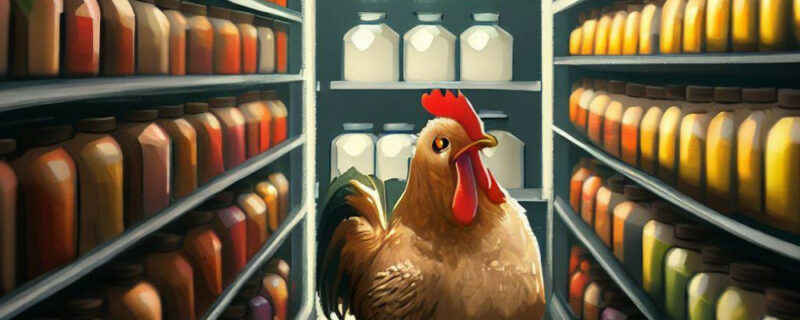Keeping your chickens healthy and egg production high depends on more than just good feed. One overlooked aspect is the proper use of supplements for healthy egg-laying chickens. It’s a game-changer for many backyard poultry enthusiasts. In this post, we’ll explore the best supplements to keep your hens clucking and your egg baskets full.
The Importance of a Balanced Diet for Chickens
A chicken’s diet directly impacts its health and egg-laying capabilities. Like us, they require a balanced intake of proteins, vitamins, minerals, carbohydrates, and fats to keep their bodies functioning optimally.
These components are important, but arguably the most important element of your chickens’ diet is water. Without water, your chickens will perish in a few days. This article is about supplements so I won’t dwell on the importance of water, but I do feel that when discussing chickens’ health fresh water needs to be emphasized.
Okay, moving on…
Key Components of a Chicken’s Diet
- Proteins: Proteins are crucial to the growth and development of poultry. They provide the building blocks, called amino acids, that the body uses to grow, repair, and maintain its cells and tissues. Proteins are particularly crucial in the growth of new feathers, which are made up of keratin, a type of protein. In laying hens, proteins also contribute to egg production, as the egg white (albumen) is predominantly protein.
- Vitamins: These are needed for various metabolic activities in poultry. For example, Vitamin A is essential for vision and immune function, while B vitamins like riboflavin, niacin, and pantothenic acid are critical for energy production. Vitamin D is crucial for calcium absorption, which is important for bone health and eggshell formation. Vitamin E acts as an antioxidant, protecting body cells from damage.
- Minerals: Minerals, especially calcium and phosphorus, are key for the health and productivity of poultry. Calcium is needed for the formation of eggshells and the maintenance of bone health. Phosphorus works hand-in-hand with calcium in maintaining bone health. A well-balanced ratio of calcium to phosphorus is crucial for proper growth and development.
- Carbohydrates: These are the primary source of energy for poultry. They’re used to fuel all the body’s functions, from movement to temperature regulation. Most carbohydrates in poultry diets come from grains like corn, wheat, and barley.
- Fats: Fats also supply energy but more densely compared to carbohydrates. They also provide essential fatty acids that the body cannot produce on its own, such as linoleic acid, which is important for skin health, feathering, and egg production. Fats also aid in the absorption of fat-soluble vitamins (A, D, E, K).
In order to ensure the best health and productivity, it’s crucial to provide poultry with a balanced diet that adequately covers all these nutritional requirements. The exact proportions can vary depending on the bird’s age, species, and purpose (e.g., egg-laying hens vs. meat chickens).
Common Supplements for Healthy Egg Production
Nutritional supplements can fill the gaps in a chicken’s diet, ensuring your hens are laying the best eggs they possibly can.
Calcium Supplements
Calcium plays a pivotal role in eggshell formation. Insufficient calcium can lead to thin, weak shells or even shell-less eggs.
Oyster Shell
Oyster shell is a popular calcium supplement. It’s cheap, effective, and easy to provide on the side for your birds to peck at their leisure.
Crushed Egg Shells
Recycling your kitchen’s eggshells can also provide a cost-effective calcium supplement. Make sure they’re cleaned and crushed to avoid any health risks.
Grit
Grit is essential for a chicken’s digestion. It grinds down grains and other hard foods in the gizzard. There are two types – insoluble (stones, gravel) and soluble (oyster shell, limestone).
Probiotics
Probiotics promote healthy gut flora, improving nutrient absorption, boosting immunity, and enhancing overall health.
When and How to Supplement Your Chickens’ Diet
Knowing when and how to supplement your chickens’ diet can make a world of difference in their health and egg production.
Moulting Period
During moulting, chickens replace old feathers with new ones, requiring extra protein. Providing a protein supplement during this period can speed up the moulting process and reduce stress.
Brooding and Laying Periods
Brooding hens and those laying eggs have increased nutritional needs. They may benefit from supplemental calcium and vitamins.
Tips for Administering Supplements to Your Chickens
Administering supplements effectively is just as important as choosing the right ones. Always follow package instructions carefully.
Dosage
Over-supplementing can be just as harmful as a deficiency. Always adhere to the recommended dosages on the package.
Mixing with Feed
Some supplements can be mixed directly into your chickens’ feed. This method ensures they consume the supplement. Chickens will readily gobble up mealworms since they are a naturally occurring part of a chicken’s normal diet if they can find them, so they can be mixed with regular feed or fed separately.
Offering Supplements Separately
For supplements like oyster shells and grit, it’s best to offer them in a separate feeder. Chickens will self-regulate their intake based on their needs.
Conclusion
Proper nutrition is the cornerstone of healthy egg-laying chickens. By understanding and providing the right supplements, you’re not just increasing the quantity of your egg haul but also improving the quality of your eggs and your chickens’ lives.
Thanks for reading! Please leave a comment if you would be so kind.
Dave
Chickenmethod.com


